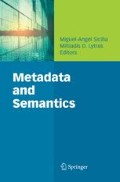Manual indexing of learning resources according to metadata standards is a laborious task. The introduction of automatic metadata generation methods is a developing research field with diverse approaches, which appears as an option having the advantage of the economy of work for not having to manually create metadata. In this paper, a methodology for automatic generation of metadata which exploits relations between resources to be described is introduced and examples and empirical data on the application of the methodology to the LOM (Learning Object Metadata) standard are presented. The methodology comprises the execution of consecutive steps of actions aiming at identifying inference rules for automatic generation of a resource's metadata based on pre-existing metadata of its related resources.
Access this chapter
Tax calculation will be finalised at checkout
Purchases are for personal use only
Preview
Unable to display preview. Download preview PDF.
References
Bourda Y, Doan B-L, Kekhia W (2002) A semi-automatic tool for the indexation of learning objects. In Proceedings of World Conference on Educational Multimedia, Hypermedia and Telecommunications 2002 (pp. 190–191). Chesapeake, VA: AACE.
Brase J, Painter M, Nejdl W (2003) Completion axioms for learning object metadata -Towards a formal description of LOM. In 3rd international conference on advanced learning technologies (ICALT). Athens, Greece.
Cardinaels K, Meire M, Duval E (2005) Automating metadata generation: the simple indexing interface. In Proceedings of the 14th international conference on World Wide Web, Chiba, Japan.
Dublin Core Metadata Initiative (2002) DCMI Metadata Terms http://dublincore.org/documents/dcmi-terms/. Accessed 15 March 2007.
Dublin Core Metadata Initiative (2005) Using Dublin Core — The Elements http://dublincore.org/documents/usageguide/elements.shtml. Accessed 15 March 2007.
Doan B-L, Bourda Y (2005) Defining several ontologies to enhance the expressive power of queries. In volume 143 of CEUR, workshop Proceedings, on Interoperability of web-based Educational Systems, held in conjunction with WWW'05 conference, Chiba, Japan, Technical University of Aachen (RWTH).
Duval E (2001) Metadata Standards: What, Who & Why? Journal of Universal Computer Science, Vol. 7, no 7, 2001, pp. 591–601.
Duval E, Hodgins W (2004) Making metadata go away - hiding everything but the benefits. In DC-2004: Proceedings of the International Conference on Dublin Core and Metadata Applications, pp. 29–35.
E-Learning Consortium (2003) Making sense of learning specifications and standards: A decision's maker's guide to their adoption (2e). The Masie Centre. http://www.masie.com/ standards/s3-2nd-edition.pdf. Accessed 15 March 2007.
Engelhardt M et al (2006) Reasoning about eLearning Multimedia Objects. In J. Van Ossenbruggen, G. Stamou, R. Troncy, V. Tzouvaras (Ed.) Proc. of WWW 2006, Intern. Workshop on Semantic Web Annotations for Multimedia (SWAMM).
Friesen N (2004) International LOM Survey: Report (Draft). http://dlist.sir.arizona.edu/403/ 01/LOM_Survey_Report2.doc. Accessed 15 March 2007.
Greenberg J, Spurgin K, Crystal A (2005) AMeGA (Automatic Metadata Generation Applications) Project, University of North Carolina.
Greenberg J, Spurgin, K, Crystal A (2006) Functionalities for Automatic-Metadata Generation Applications: A Survey of Metadata Experts' Opinions. International Journal of Metadata, Semantics and Ontologies. Vol. 1, No. 1, 2006.
Hatala M, Richards G (2003) Value-added metatagging: Ontology and rule based methods for smarter metadata. In RuleML, pp. 65–80.
Horton W, Horton K (2003) E-learning Tools and Technologies. Indianapolis: Wiley Publishing.
IEEE. 1484.12.1 (2002) Draft Standard for Learning Object Metadata. Learning Technology Standards Committee of the IEEE. http://ltsc.ieee.org/wg12/files/ LOM_1484_12_1_v1_Final_Draft.pdf. Accessed 15 March 2007.
Liddy E D et al (2002) Automatic metadata generation & evaluation. In Proceedings of the 25th Annual International ACM SIGIR Conference on Research.
Margaritopoulos M, Manitsaris A, Mavridis I (2007) On the Identification of Inference Rules for Automatic Metadata Generation. In Proceedings of the 2nd International Conference on Metadata and Semantics Research (CD-ROM), Ionian Academy, Corfu, Greece.
Motelet O (2005) Relation-based heuristic diffusion framework for LOM generation. In Proceedings of 12th International Conference on Artificial Intelligence in Education AIED 2005 - Young Researcher Track, Amsterdam, Holland.
Najjar J, Ternier S, Duval E (2003) The Actual Use of Metadata in ARIADNE: an Empirical Analysis. In Proceedings of ARIADNE Conference 2003.
Sicilia M A et al (2005) Complete metadata records in learning object repositories: some evidence and requirements. International Journal of Learning Technology, 1(4), pp. 411–424.
Steinmetz R, Seeberg C (2003) Meta-Information for Multimedia eLearning. Computer science in perspective, Springer-Verlag New York, Inc.
Author information
Authors and Affiliations
Corresponding authors
Editor information
Editors and Affiliations
Rights and permissions
Copyright information
© 2009 Springer Science+Business Media, LLC
About this paper
Cite this paper
Margaritopoulos, M., Kotini, I., Manitsaris, A., Mavridis, I. (2009). Identifying Inference Rules for Automatic Metadata Generation from Pre-existing Metadata of Related Resources. In: Sicilia, MA., Lytras, M.D. (eds) Metadata and Semantics. Springer, Boston, MA. https://doi.org/10.1007/978-0-387-77745-0_15
Download citation
DOI: https://doi.org/10.1007/978-0-387-77745-0_15
Publisher Name: Springer, Boston, MA
Print ISBN: 978-0-387-77744-3
Online ISBN: 978-0-387-77745-0
eBook Packages: Computer ScienceComputer Science (R0)

